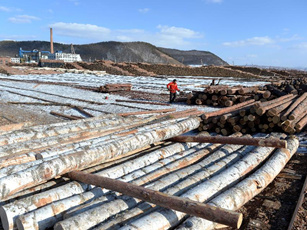China to phase out commercial logging of natural forests by 2017

 0 Comment(s)
0 Comment(s) Print
Print E-mail CNTV, December 7, 2015
E-mail CNTV, December 7, 2015
China is advancing its Natural Forest Protection Program and phasing out all commercial logging of natural forests by 2017. That's a big commitment for China to protect the lungs of the planet, but many forestry companies will be facing great pressure to survive after the ban takes effect. What can they do to stand on their own feet again? Our reporter Xing Zheming visits the Changbai Mountain Forestry Industry Group to see what it is doing to make it all happen.
Shi Wenguang has been a logger for nearly 30 years. But this year, he saw the biggest change in his life when commercial logging in natural forests in northeast China was banned for good.
Shi's chainsaws are kept in the storeroom, but some can still work.
"I've been a logger my whole life. What can I do for a living after the ban? How can I make money? Loggers like me don't have much education. We feel quite helpless and incompetent to seek ways out just by ourselves," Shi said.
However, over the years, they have come to know the forests like the palms of their hands.
So after the ban, some of the loggers have been hired as forest rangers. They now have become the guardians of the forests.
"I want to be a forest ranger because I have cut down so many trees before. Now I want to protect these trees and keep them for the future generations," Shi said.
But the ranger jobs are far from enough for a company that once greatly relied on logging and timber processing.
This place used to be a timber yard. Just check out the scale of this place. You can just imagine how much timber could be stored. And what does the ban of logging mean to the local economy. Forest enterprises say they are determined to protect the environment, but they also need to find new jobs for the workers here.
The Changbai Mountain Forestry Industry Group is in charge of about 24,000 square kilometres of forests. That's about 80% of the land size of Switzerland. The company is transforming its business model instead of cutting down trees, it is trying to take advantage of what forests can offer.
Green industries are booming. That includes the growth of edible and medical fungus deep in the woods. The workers are making 1 million plastic bags as growing medium for mushrooms, using leftover biomass from the forests. The bags will be distributed to people living in the forests next spring.
"Forestry workers can grow fungus themselves and earn more money than before. Now we can earn 20 million yuan in revenue every year," Sun Chengzhong with Bajiazi Forestry Company said.
Meanwhile, forest zones are also encouraged to develop tourism in order to provide more jobs to local people. The Lake of Laolike became famous for its snow views after being discovered by some backpackers.
The developers tell that this forest will only be opened to tourists in winter to minimize the impact on the eco-system.
Tourists, especially those from South China, are pouring in to see the beautiful snow world.
"We can't see such big snow in cities. We are very excited visiting here and I think they preserve the environment very well. I will recommend my friends to visit here," Tourist from Shanghai Tang Yanqiu said.
The forests remain the same, but people's mindsets are changing. People living deep in the forests are trying to find a new balance with Mother Nature.





